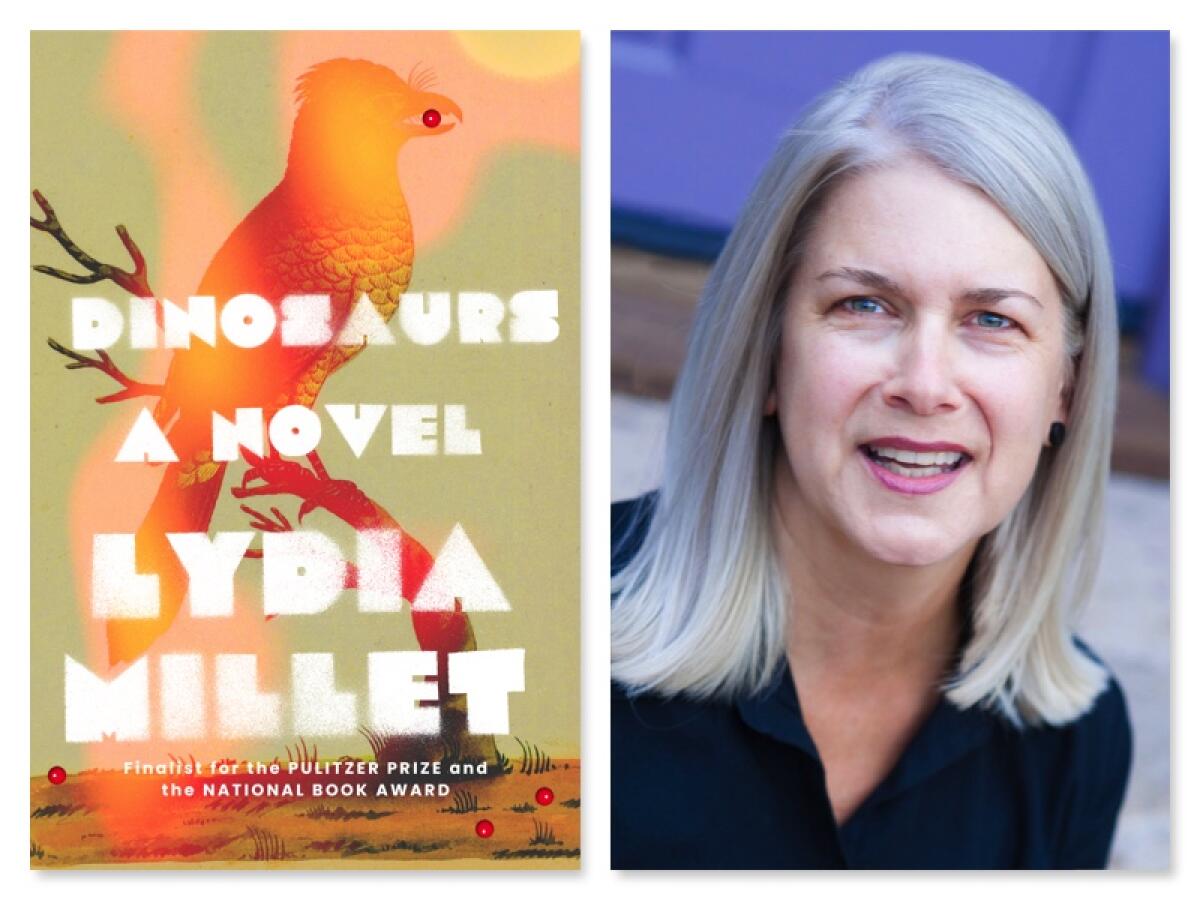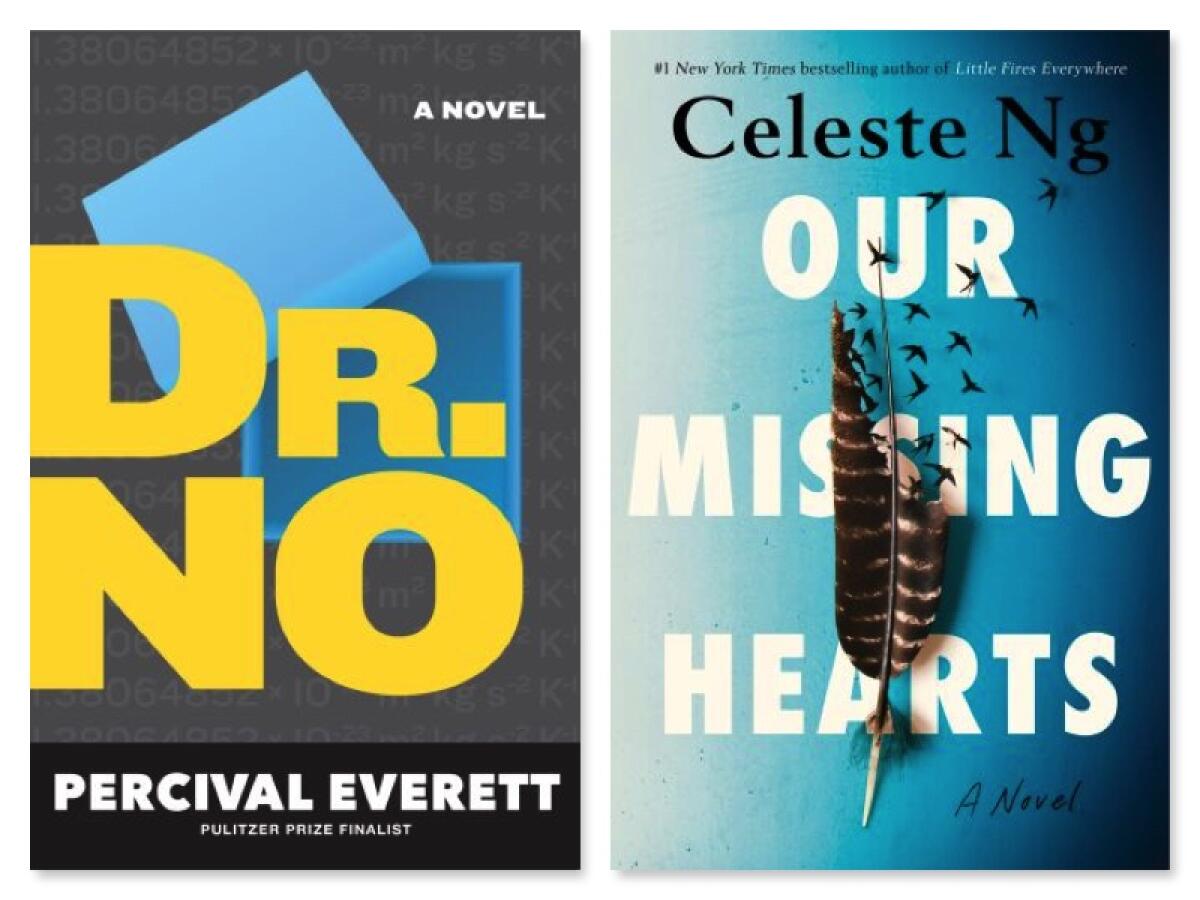Book club: What to read after Lydia Millet’s ‘Dinosaurs’

- Share via
Good morning, and welcome to the L.A. Times Book Club newsletter.
During Wednesday’s book club, author Lydia Millet talked about driving cross-country being different than at any time in the past.
Now when we get where we’re going, the coating of smashed bugs we complained about all our lives just isn’t there. And that absence of something we once considered a nuisance tells us something: that the bugs are going extinct. Not just the biters and stingers but all the bugs, including those that are food for other animals, and the pollinators we humans depend on for our food. The creatures that we are driving to extinction will, by their absence, drive our own extinction if nothing is done.
Millet says the appropriate reaction to human-caused extinction is to get angry, and then get busy on turning this around.
Extinction is a running theme in much of Millet’s work. Her new novel, “Dinosaurs,” is about the rebirth of a man who seeks solitude in the Arizona desert only to find himself living next to a family in a glass house. Throughout the story, apocalyptic reminders fall from the sky in the form of birds that turn up dead in the desert. They are the dinosaurs of the title, as Millet riffs on the idea that birds are the living descendants of the ancient creatures.
In more than a dozen books, Millet has emerged as a major Western voice on the environment. She tackles this subject in her fiction as well as nonfiction essays, and in her day job as chief editor at the Center for Biological Diversity.
“Dinosaurs” follows Millet’s 2020 novel, “A Children’s Bible,” a National Book Award finalist with climate change at the heart of the story. On Wednesday she said the story reflected her anger about the world her own children will inherit.
After book club night, Millet shared her suggestions for further reading.
“The books I love that I’m reading right now are by Dan Flores, his new one, “Wild New World,” and a previous one, “American Serengeti.” They should be required reading across our land,” she says. “Sweeping and historically precise, they show us what we’ve done to the Eden that America once was. And inspire us to save what’s left.”
Times environmental reporter Rosanna Xia, a 2020 Pulitzer Prize finalist whose work has been featured in the “Best American Science and Nature Writing” anthology, also shared her current reading list. She suggests:
“Believers: Making a Life at the End of the World,” by Lisa Wells. Xia moderated a panel with Wells at the Festival of Books in April. “Lisa offers a thoughtful reflection for those who are starting to grapple with the enormity of what we’re facing.”
“An Immense World: How Animal Senses Reveal the Hidden Realms Around Us,” by Ed Yong. “It’s a stunning feat of reporting and made me think more deeply about all the aspects of our planet that we don’t think about.”
“The Cold Canyon Fire Journals: Green Shoots and Silver Linings in the Ashes,” by Robin Lee Carlson. “It’s a beautiful exploration of the ecological legacy of wildfires in California.”
One more: Book club regulars will recall that Xia joined us last year for a conversation with author Charlotte McConaghy about “Migrations,” the story of a woman who embarks on a harrowing mission to Antarctica in search of the last Arctic terns.
McConaghy said she was inspired to write a novel focused on climate change during a trip to Iceland. She decided her story’s harsh reality needed to be tempered with a gripping plot — and a glimmer of hope that all is not lost. “I wanted to energize people and myself to come out of the other side of despair and apathy and into a place of hope, love and action.”
Millet, by the way, says climate fiction isn’t a genre. It’s hard realism.
“Climate change is many things: a physical, social and psychological condition; a landscape; a way of being; a time; a threat; a series of events; a political battlefield; a force for cultural schism,” she writes in an essay for The Times.
“The one thing it isn’t is fantasy. Or a counterfactual of any kind.”

What’s next
On Nov. 16, the L.A. Times Book Club returns to the Autry Museum of the West for an evening featuring novelist Percival Everett discussing his new novel, “Dr. No,” with Times columnist LZ Granderson. A USC English professor, Everett is the author of more than 30 novels, including “The Trees,” shortlisted for the 2022 Booker Prize. Get tickets.
On Dec. 8, novelist Celeste Ng joins us to discuss her new bestseller, “Our Missing Hearts,” with columnist Patt Morrison. The novel is about a 12-year-old boy’s epic quest to find his missing mother. Get tickets for this virtual event.
Keep reading
L.A. visionary: Mike Davis, the “City of Quartz” author who chronicled the forces that shaped Los Angeles, died Tuesday. Davis wrote more than a dozen books, including 2020’s “Set the Night on Fire: L.A. in the Sixties,” and 1998’s “Ecology of Fear: Los Angeles and the Imagination of Disaster.” He once told Salon: “I love Los Angeles. How can you not see that? I suppose the book is, in the end, a failure if it betrays none of the sense of deep feeling I have about the city. But that’s where being a radical comes in — you have to rain on the parade.” Read more about his legacy.
Royal storyteller: Prince Harry’s much-awaited memoir, “Spare,” will be released Jan. 10. The title plays on his status as a royal “spare” — not the first in line to succession. Prince William, who is next in line to the British throne, and younger brother Prince Harry were sometimes referred to as “the heir and the spare.” The New York Times notes that the prince’s ghostwriter, former L.A. Times reporter J.R. Moehringer, previously worked on tennis player Andre Agassi’s autobiography and “is known for probing the tensions inherent in father-son relationships.”
November books: Reviewer Bethanne Patrick shares 10 new titles to add to your reading list next month.
“Thrones” update: George R.R. Martin tells Stephen Colbert “The Winds of Winter” is now three-quarters finished, via the Hollywood Reporter.
Page to screen: The Buendía family is coming to life in a new series based on the novel “One Hundred Years of Solitude” by legendary Colombian author Gabriel García Márquez. Netflix is developing the project in cooperation with the author’s sons, filmmaker and 2021 book club guest Rodrigo García and Gonzalo García. Here’s a glimpse.
More screen play: The Washington Post rounds up nine book adaptations coming to big and small screens, including “Daisy Jones and the Six” by bestselling L.A. novelist Taylor Jenkins Reid.
Ideas exchange: The L.A. Times and PEN America will present “Reading Between the Lines,” a Nov. 3 virtual discussion on race, equity, books and the cultural diversity in publishing. Guests include Santa Ana author Marytza K. Rubio, Legacy Lit publisher Krishan Trotman, McGill University associate professor and author Richard Jean So and Little Brown and Co. publicity director Elizabeth Garriga.
If you enjoy our community book club: Please consider atax-deductible donation to the new Los Angeles Times Community Fund to help our book club and community forums keep going and growing.

Last word
In Alta magazine, Amy Reardon describes our October book this way: “Dinosaurs reads like a sanctuary, an escape to an imaginary oasis from an America that feels increasingly cruel. It’s a piña colada poolside with a twist of Ted Lasso, the kind of book that comes to mind during the day while you’re doing other things, making you long for bedtime and a return to this Arizona fishbowl.”
Sign up for our Book Club newsletter
Get the latest news, events and more from the Los Angeles Times Book Club, and help us get L.A. reading and talking.
You may occasionally receive promotional content from the Los Angeles Times.




